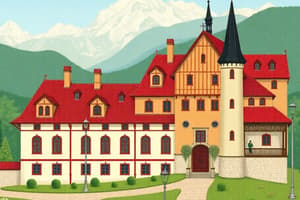Podcast
Questions and Answers
What is the oldest known winery and in which country was it discovered?
What is the oldest known winery and in which country was it discovered?
- The West Azerbaijan winery in Iran
- The Areni-1 winery in Armenia (correct)
- The Vayots Dzor winery in Georgia
- The Sicilian winery in Italy
Which ancient civilization was instrumental in distributing wine, wine grapes, and winemaking technology throughout the Mediterranean region?
Which ancient civilization was instrumental in distributing wine, wine grapes, and winemaking technology throughout the Mediterranean region?
- The Phoenicians (correct)
- The Egyptians
- The Romans
- The Greeks
Which country developed the first modern wine industry in East Asia after grapevines were brought back from Europe?
Which country developed the first modern wine industry in East Asia after grapevines were brought back from Europe?
- China
- Taiwan
- Japan (correct)
- South Korea
What was the reason behind the emperor Domitian passing the first wine laws on record in AD c. 92?
What was the reason behind the emperor Domitian passing the first wine laws on record in AD c. 92?
Which countries are considered New World producers of wine?
Which countries are considered New World producers of wine?
Which ancient civilization embraced the production aspect of wine as a way to expand and create economic growth throughout the region?
Which ancient civilization embraced the production aspect of wine as a way to expand and create economic growth throughout the region?
Which ancient civilization had a thriving royal winemaking industry established in the Nile Delta following the introduction of grape cultivation from the Levant to Egypt c. 3000 BC?
Which ancient civilization had a thriving royal winemaking industry established in the Nile Delta following the introduction of grape cultivation from the Levant to Egypt c. 3000 BC?
Which louse brought widespread destruction to grapevines, wine production, and those whose livelihoods depended on them in the late 19th century?
Which louse brought widespread destruction to grapevines, wine production, and those whose livelihoods depended on them in the late 19th century?
Which ancient civilization had a love for winemaking and consumption dating back 6000 years?
Which ancient civilization had a love for winemaking and consumption dating back 6000 years?
Flashcards
Earliest wine production
Earliest wine production
The earliest known evidence of deliberate wine production dates back to approximately 6000 BC in Georgia and Armenia.
Wine and religion
Wine and religion
The altered state of consciousness induced by wine has been considered religious since its inception.
Phoenicians and wine
Phoenicians and wine
The Phoenicians spread wine, grapes, and winemaking knowledge throughout the Mediterranean through their vast trading network.
Roman Empire and wine
Roman Empire and wine
Signup and view all the flashcards
Phylloxera and wine
Phylloxera and wine
Signup and view all the flashcards
Phylloxera's positive impact
Phylloxera's positive impact
Signup and view all the flashcards
New World wine producers
New World wine producers
Signup and view all the flashcards
Oldest surviving wine bottle
Oldest surviving wine bottle
Signup and view all the flashcards
Study Notes
A Brief History of Wine
-
The oldest fossil proto-wines without grapes were found in China in 7000 BC.
-
Evidence of ancient wine production was found in Georgia and Armenia in c. 6000 BC, West Azerbaijan province of Iran from c. 5000 BC, and Sicily from c. 4000 BC.
-
The earliest evidence of a grape and rice mixed based fermented drink sometimes compared to wine was found in ancient China (c. 7000 BC).
-
The altered consciousness produced by wine has been considered religious since its origin.
-
Wine production and consumption increased, burgeoning from the 15th century onwards as part of European expansion.
-
The oldest-known winery was discovered in the "Areni-1" cave in Vayots Dzor, Armenia, dated to c. 4100 BC.
-
Wine played an important role in ancient Egyptian ceremonial life, and a thriving royal winemaking industry was established in the Nile Delta following the introduction of grape cultivation from the Levant to Egypt c. 3000 BC.
-
The Phoenicians were instrumental in distributing wine, wine grapes, and winemaking technology throughout the Mediterranean region through their extensive trade network.
-
Much of modern wine culture derives from the practices of the ancient Greeks.
-
The Greeks embraced the production aspect of wine as a way to expand and create economic growth throughout the region.
-
The fame of Persian wine has been well known in ancient times.
-
The emphasis of viticulture in Greece increased with economic demand, and Greek wine was widely known and exported throughout the Mediterranean.A Brief History of Wine
-
Ancient Greeks and Thracians had a love for winemaking and consumption dating back 6000 years.
-
The Roman Empire was integral in the development of viticulture and oenology, with wine being an integral part of the Roman diet.
-
During the Roman Empire, social norms began to shift as the production of alcohol increased, leading to widespread drunkenness and alcoholism.
-
Viniculture expanded so much that by AD c. 92 the emperor Domitian was forced to pass the first wine laws on record, banning the planting of any new vineyards in Italy and uprooting half of the vineyards in the provinces in order to increase the production of grain.
-
Medieval Europe saw wine as the common drink for all social classes in the south, while beer and ale were more common in the north and east.
-
Wine was necessary for the celebration of the Catholic Mass, so assuring a supply was crucial and the Benedictine and Cistercian monks became some of the largest wine producers in Europe.
-
In the late 19th century, the phylloxera louse brought widespread destruction to grapevines, wine production, and those whose livelihoods depended on them.
-
The devastation led to the positive transformation of Europe's wine industry, including the standardization of cuvées and the uprooting of bad vineyards.
-
Australia, New Zealand, South Africa, and other countries without a wine tradition are considered New World producers, with wine production beginning in the Cape Province of South Africa in the 1680s.
-
The first modern wine industry in East Asia was Japanese wine, developed in 1874 after grapevines were brought back from Europe.
-
Wine is often associated with Argentina, California, and Chile, with Old World grape varieties being the most common.
-
The oldest surviving bottle still containing liquid wine, the Speyer wine bottle, belonged to a Roman nobleman and is dated at 325 or 350 AD.
Studying That Suits You
Use AI to generate personalized quizzes and flashcards to suit your learning preferences.



